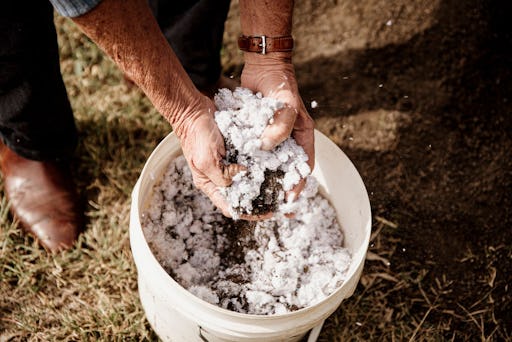A cotton farm just outside the rural town of Goondiwindi is the site of a pioneering trial to test whether shredded cotton products returned to the soil could provide a natural and scalable solution to textile waste.
The aim is to analyse the breakdown process of the cotton depending on how much material is added, as well as the impacts on soil nutrition, respiration, and microbial biomass. A successful project could provide the evidence to scale up the project further, with the potential to develop a large-scale circular solution for cotton textiles in Australia.
Approximately two tonnes of used textiles including cotton textiles, garments and end of life State Emergency Service coveralls have been processed by clothing recycler Worn Up for use in the project. These were transported to “Alcheringa” farm in Goondiwindi, before being applied to the cotton field.
The field is being prepared for planting the next cotton crop in October. It’s hoped the fabrics will break down in the soil, increase microbial activity, lock in carbon and provide cover to improve soil moisture. Projections show 2,250kg of carbon dioxide equivalent emissions will be mitigated through the breakdown of these garments in soil rather than landfill.

Processed cotton from used textiles ready to be applied to soil. Image: Cotton Australia
In the first phase of the project cotton fabrics were tested in a lab environment to assess what might happen during the biodegradation process, with results showing potential benefits including carbon and water retention in soils.
The collaborative project is being carried out in partnership between the Queensland Government, Goondiwindi Cotton, Sheridan, Cotton Australia, Worn Up and Cotton Research and Development Corporation funded soil scientist Dr Oliver Knox, under the guidance of circular economy specialists Coreo.
According to the National Waste Report 2020, textiles have one of the lowest recycling rates of any waste category despite about 800,000 tonnes of textile, leather and rubber waste being discarded in the 2018-19 financial year. For advice on end-of-life alternatives for clothing and other textiles, visit RecyclingNearYou.